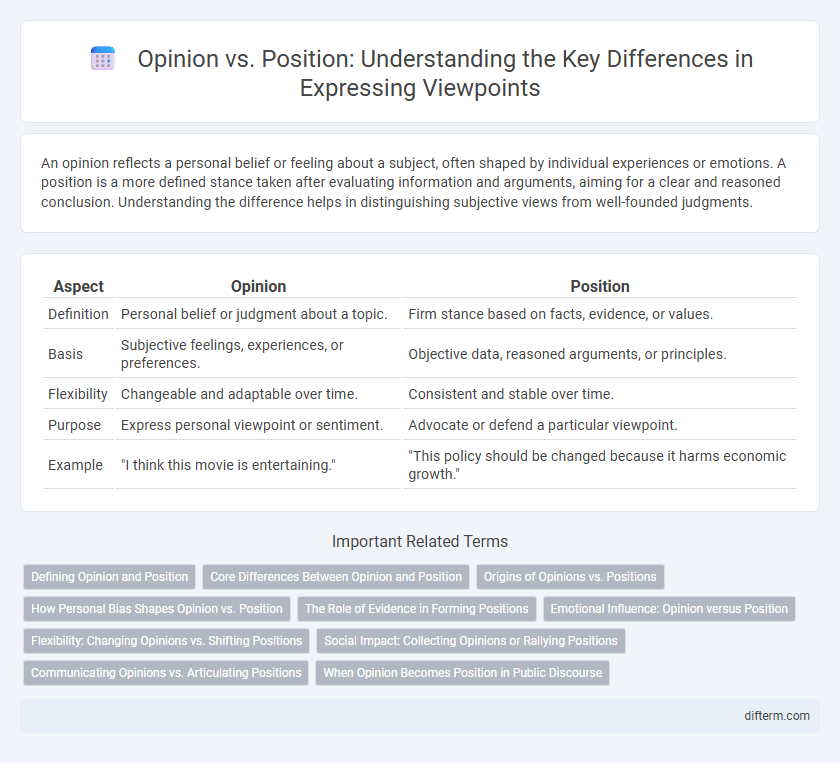An opinion reflects a personal belief or feeling about a subject, often shaped by individual experiences or emotions. A position is a more defined stance taken after evaluating information and arguments, aiming for a clear and reasoned conclusion. Understanding the difference helps in distinguishing subjective views from well-founded judgments.
Table of Comparison
| Aspect | Opinion | Position |
|---|---|---|
| Definition | Personal belief or judgment about a topic. | Firm stance based on facts, evidence, or values. |
| Basis | Subjective feelings, experiences, or preferences. | Objective data, reasoned arguments, or principles. |
| Flexibility | Changeable and adaptable over time. | Consistent and stable over time. |
| Purpose | Express personal viewpoint or sentiment. | Advocate or defend a particular viewpoint. |
| Example | "I think this movie is entertaining." | "This policy should be changed because it harms economic growth." |
Defining Opinion and Position
An opinion reflects a personal belief or judgment shaped by individual experience and emotions, emphasizing subjectivity and perspective. A position represents a clearly defined stance on an issue, often supported by evidence and reasoning, emphasizing objectivity and argumentation. Understanding the distinction helps clarify communication by distinguishing personal viewpoints from structured arguments.
Core Differences Between Opinion and Position
Opinion reflects an individual's personal beliefs, feelings, or interpretations about a topic, often subjective and influenced by emotions or experiences. Position represents a more structured and defensible stance, typically supported by evidence, facts, and logical reasoning in debates or formal discussions. Understanding the core differences between opinion and position is crucial for effective communication and critical thinking in both academic and professional contexts.
Origins of Opinions vs. Positions
Opinions often stem from personal experiences, emotions, and individual values, reflecting subjective interpretations unique to each person. Positions, however, are typically formed through logical analysis, external evidence, and strategic considerations, representing more objective stances. Understanding the origins reveals that opinions are fluid and evolving, while positions tend to be deliberate and structured for debate or decision-making.
How Personal Bias Shapes Opinion vs. Position
Personal bias significantly shapes opinion by filtering information through individual experiences, emotions, and beliefs, leading to subjective judgments. In contrast, a position is typically grounded in objective analysis, emphasizing facts and logical reasoning over personal influence. Understanding this distinction helps clarify how opinions are inherently fluid and positions are more stable, often reflecting deliberate stances in debates or discussions.
The Role of Evidence in Forming Positions
The role of evidence in forming positions is crucial as it transforms subjective opinions into well-substantiated claims grounded in facts. Positions anchored by credible data and logical analysis foster constructive dialogue and informed decision-making. Evidence-based positions reduce bias and increase the likelihood of consensus in debates and policy discussions.
Emotional Influence: Opinion versus Position
Opinions are often shaped by emotional influence, reflecting personal feelings and subjective experiences that vary widely among individuals. In contrast, positions tend to be more structured and anchored in rational analysis or objective criteria, making them less susceptible to emotional fluctuation. Understanding the emotional underpinnings of opinions versus the logical foundation of positions clarifies how people form beliefs and argue viewpoints.
Flexibility: Changing Opinions vs. Shifting Positions
Opinions exhibit flexibility, allowing individuals to adapt their beliefs based on new information or experiences, reflecting an openness to change. Positions tend to be more rigid and formalized, often linked to strategic interests or organizational stances that resist alteration. Understanding this distinction helps clarify debates where openness to evolving viewpoints contrasts with steadfast policy or ideological commitments.
Social Impact: Collecting Opinions or Rallying Positions
Opinions reflect individual perspectives shaped by personal experiences and emotions, enabling diverse social narratives and fostering empathy within communities. Positions represent organized stances aimed at influencing public policies or mobilizing collective action, often serving strategic roles in advocacy campaigns and social movements. Understanding the distinction enhances social impact by balancing genuine dialogue with effective activism.
Communicating Opinions vs. Articulating Positions
Communicating opinions involves expressing personal views or feelings that may be subjective and flexible, while articulating positions requires presenting well-reasoned, clear stances supported by evidence or logic. Effective communication of opinions fosters openness and dialogue, whereas articulating positions emphasizes persuasion and clarity in debates or discussions. Understanding the distinction enhances critical thinking and improves the ability to engage constructively in various social or professional contexts.
When Opinion Becomes Position in Public Discourse
Opinion becomes position in public discourse when individual beliefs are articulated with authority and used to influence policy or social norms. This transformation occurs as opinions gain widespread acceptance, are defended persistently, and become integral to identity or group alignment. The shift from personal perspective to public stance significantly shapes debates, framing, and decision-making processes within society.
opinion vs position Infographic

 difterm.com
difterm.com